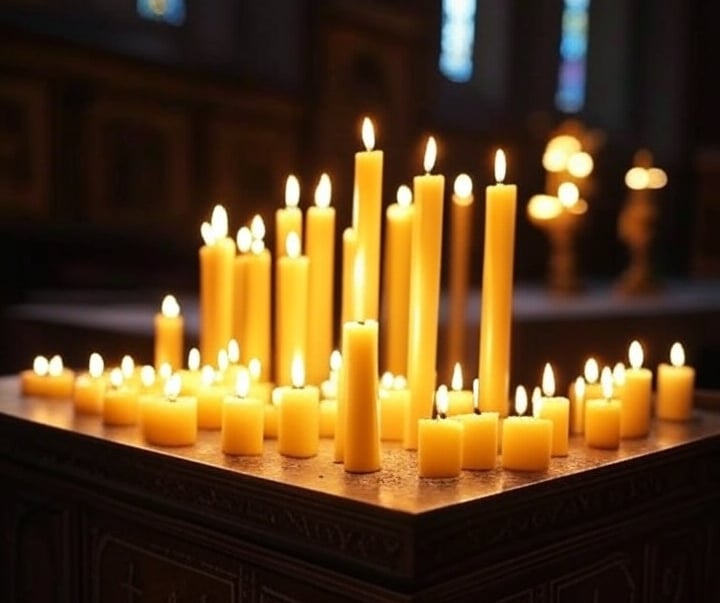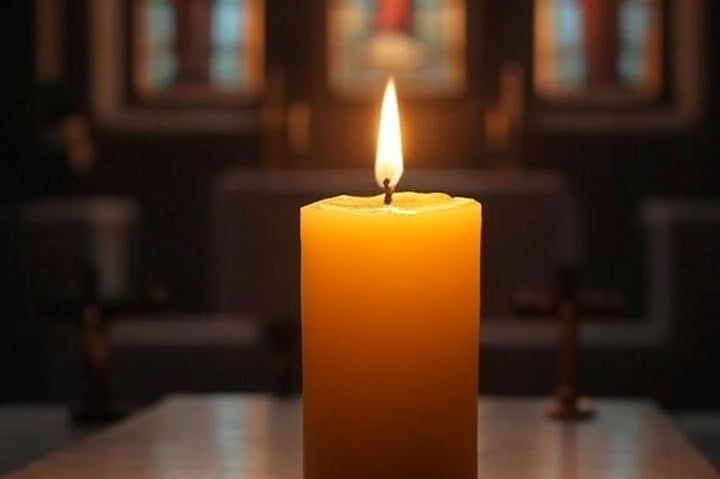Illuminating Divinity: The Sacred History of Beeswax Candles in Religious Traditions
Explore the sacred history of beeswax candles in Christian and Jewish traditions. Beeswax Pat offers luxury insights, revealing their divine symbolism with timeless elegance.
Beeswax Pat
8/1/20254 min read


The Timeless Luminance of Beeswax
Beeswax candles, with their warm, golden glow and natural fragrance, have illuminated religious ceremonies for centuries, embodying purity, divinity, and spiritual connection. This exploration delves into their references within religious texts, most commonly found in Christianity and Judaism, where their use is most documented, while also exploring other faiths.
Beeswax Candles in Christian Tradition: Liturgical Significance and Textual References
In the Christian tradition, particularly within Catholicism, beeswax candles hold a profound symbolic and practical role in liturgical practices. Their use is not merely functional but deeply rooted in theological symbolism and historical church law.
Symbolic Meaning
Beeswax, produced by virgin worker bees, is seen as a symbol of purity, representing the pure flesh of Christ born of the Virgin Mary. The wick symbolizes Christ's soul, and the flame signifies His divinity. This symbolism is detailed in various Catholic writings, such as those from Live Your Faith Catholic, which note that beeswax evokes the sweetness of God's grace and symbolizes fertility.
Liturgical Texts and Regulations
The Missale Romanum, the official liturgical book of the Roman Catholic Church, explicitly orders the use of candles made from wax (luminaria cerea) for Mass, with beeswax being the preferred material. Historical regulations, as outlined by the United States Conference of Catholic Bishops, required altar candles to be composed primarily of pure beeswax prior to the Second Vatican Council, with percentages often set at least 51% for general use and higher for specific candles like the Paschal candle. The Paschal candle, lit during Easter services, must be made entirely of beeswax, symbolizing Christ as the light of the world, as noted in Catholic Culture's article.
Historical Context and Texts
The use of beeswax candles in Christian liturgy dates back to early Church practices, with references in texts like the Easter Proclamation (Exsultet), recited during the Easter Vigil, which describes beeswax candles as "the work of bees and of your servants’ hands, an evening sacrifice of praise, this gift from your most holy Church". By the Middle Ages, beeswax candles were commonplace in churches, often maintained by monasteries with their own beehives, as noted in ScottishBeeCompany's historical overview.
Evolution of Practice
While current legislation, as per the General Instruction of the Roman Missal, does not specify candle composition, leaving it to bishops' conferences, the tradition of using beeswax persists in many Catholic churches for its symbolic and practical qualities. Historical decrees, such as a 1961 Italian regulation requiring at least 10% pure beeswax for Mass candles, illustrate the Church's long-standing preference.
Beeswax Candles in Jewish Tradition: Ritual Use and Textual Context
In Judaism, candles are integral to religious observances such as Shabbat and Hanukkah, with beeswax often preferred for its natural properties, though direct references in religious texts are less explicit.
Shabbat and Hanukkah Practices
Jewish law mandates lighting candles before sunset on Friday to usher in Shabbat, traditionally using oil lamps, as discussed in the Talmud. Over time, wax candles became common, with beeswax valued for its purity and clean burn. During Hanukkah, the menorah is lit with candles or oil lamps, with the Talmud specifying oil as preferred due to the miracle of the oil lasting eight days. However, beeswax candles are acceptable and popular in modern practice, as seen in Reform Judaism's activity guide.
Talmudic References
While the Talmud does not explicitly mention beeswax candles, it emphasizes the importance of lighting for rituals, such as Shabbat candles being a mitzvah that brings peace and joy to the home. This suggests a historical basis for using pure, natural materials like beeswax, aligning with Jewish values of holiness and cleanliness.
Historical Context
The Jewish Virtual Library notes that candles, including beeswax, became more widespread in medieval Europe, influenced by Catholic practices, though oil remained the traditional fuel for ritual purposes. Modern Jewish communities, such as those using Narrow Bridge Candles, often choose beeswax for its symbolic purity.
Beeswax Candles in Other Religious Traditions: Comparative Analysis
While Christianity and Judaism have the most documented traditions involving beeswax candles, other religions use candles or lamps, though beeswax is not always specified, reflecting diverse material preferences.
Hinduism: In Hindu worship, lamps filled with ghee (clarified butter) or oil are commonly used during puja, as noted in general religious studies. Beeswax candles are not traditionally part of Hindu rituals but may appear in modern, Western-influenced practices.
Buddhism: Butter lamps, often made from yak butter or other animal fats, are used in Buddhist temples and homes to symbolize wisdom and enlightenment, as discussed in spiritual significance articles. Beeswax candles may be used in Western Buddhist communities but are not traditional.
Islam: In Islamic tradition, oil lamps are used in mosques, particularly during Ramadan, with no specific mention of beeswax candles in religious texts or practices, as seen in general Islamic studies.
The Enduring Legacy of Beeswax Candles
Beeswax candles have endured through centuries of religious practice, not only for their practical benefits—such as their clean burn and natural fragrance—but also for their profound symbolic meaning. In Christianity, they represent purity, divine light, and the presence of God, with specific references in liturgical texts like the Missale Romanum and Easter Proclamation. In Judaism, while not explicitly mentioned in the Talmud, they enhance the sanctity of rituals like Shabbat and Hanukkah, valued for their natural purity. Across faiths, candles serve as a universal symbol of light triumphing over darkness, a theme that resonates deeply in spiritual contexts.
At Beeswax Pat, we honor this timeless tradition by crafting premium organic beeswax candles, made with 100% pure, USA-sourced beeswax, ensuring the highest quality and authenticity. Each candle brings both beauty and meaning to your space, connecting you to a rich heritage of faith and tradition, perfect for daily meditation, religious ceremonies, or creating a serene atmosphere.
Key Citations


Local Delivery Offered at Checkout
Serving the greater Baltimore, MD area
Contact us
beeswaxpat@gmail.com
